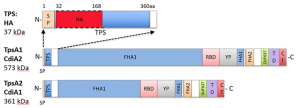A group from Molecular Infectious Disease Research Center, Chang Gung Memorial Hospital, Taoyuan, Taiwan, etc. has reported that focoidans mediate decolonization of Pseudomonas aeruginosa from gut by inhibiting secreted virulence factor interactions with mucins and enriching Bacteroides population.
https://www.ncbi.nlm.nih.gov/pmc/articles/PMC9896862/
Pseudomonas aeruginosa intestinal carriage rates are significantly higher in immunosuppressed individuals and hospitalized patients who therefore have increased risk of infections and antibiotic-associated diarrhea. Although gut microbiota acts as a barrier against intestinal pathogens, P. aeruginosa overcomes the resistance to colonization mediated by gut microbiota and innate immune system, by producing an impressive array of virulence factors. P. aeruginosa carries large protein systems that belong to two-partner secretion (TPS) family, and there is a conserved hemagglutinin (HA) domain in this TPS. The TPS system effectors are designated as major virulence determinants that are beneficial to Gram-negative pathogens (Pseudomonas is a Gram-negative).
Nutritional grade fucoidans 0.5% (w/v), from Fucus vesiculosus (FV) and Ascophyllum nodusum (AN), were supplemented in the drinking water of mice for 19 days. Among the mice that were fed with fucoidans for 14 days p.i., two patterns of decolonization were observed: (1) P. aeruginosa was eliminated from a higher proportion of the mice with time, (2) but in the remaining mice P. aeruginosa persisted throughout the study period but with declining bacterial loads over time. Of note, between p.i. day 15 and day 30 among the fucoidan fed groups proportion of the mice that were decolonized further increased to 60% (P < 0.05). It was found that there are two mechanisms by which fucoidans mediate their protective effects: first, inhibition of virulence factors TPS interactions with mucins and second, selectively promoting the growth of beneficial Bacteroides species. IC50s of interaction between TPS and intestinal mucins by FV fucoidan and AN fucoidan were less than 1 μg/mL.

